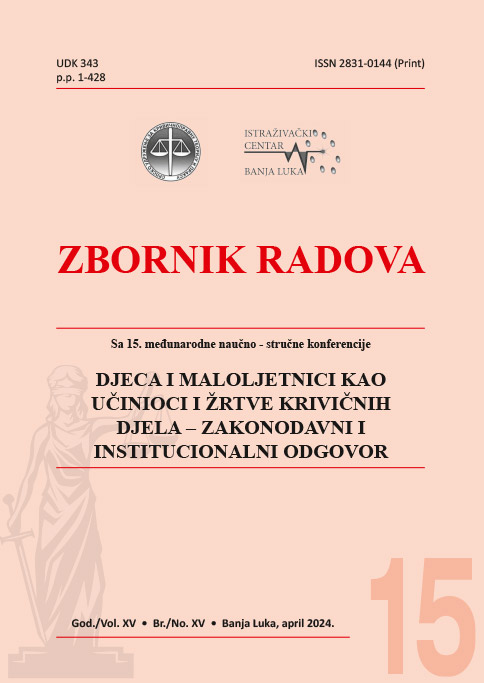HISTORICAL AND LEGAL OVERVIEW OF THE LEGAL POSITION OF DELINQUENT YOUNG PEOPLE IN OUR COUNTRY
DOI:
https://doi.org/10.7251/CEST1524109KKeywords:
youth, juvenile delinquency, guilt, history, SerbiaAbstract
The history of criminal protection and child responsibility in our country can only be judged on the basis of preserved legal monuments. The most significant preserved legal monument of the Middle Ages in the Serbs was Dušan's Code, which does not contain provisions that would explicitly indicate special rules on the protection, responsibility and punishment of minors. Only in the second half of the 19th century, in May 1847, an amendment to the Penal Code for burglary and theft was adopted in Serbia, which for the first time precisely distinguishes the category of juvenile offenders. According to the Criminal (Penal) Code for the Principality of Serbia from 1860, being a minor was a circumstance that excluded sanity. The physical and psychological integrity of the child was protected by a series of incriminations against infanticide, abortion, sexual offenses and child abuse and neglect. The Criminal Code of the Kingdom of Yugoslavia from 1929 divided all perpetrators of criminal acts up to the age of twenty-one, when they reach the age of majority, into several categories. This Code expanded the range of provisions on child protection.
After the end of the Second World War, children began to enjoy protection from all criminal offenses on an equal basis with adults. Nevertheless, certain forms of specific criminal law protection of children against criminal acts that attack or threaten the specific goods and interests of children, related to their age, are prescribed. According to the general part of the Criminal Code from 1947, it was stipulated that perpetrators under the age of fourteen are not criminally responsible for the committed crime. The most significant changes in the position of juvenile delinquents in our criminal law were made by the Law on Amendments to the Criminal Code from 1959. According to the basic provisions of the Criminal Code of Serbia and Montenegro from 1976, the age limits established by the Law on Amendments and Supplements to the Criminal Code from 1959, as well as the rules on the type of criminal sanctions that can be imposed on juvenile delinquents, have been retained. Since 2005, in the Republic of Serbia, special juvenile criminal legislation and the Law on juvenile offenders and criminal protection of minors have been in force.
